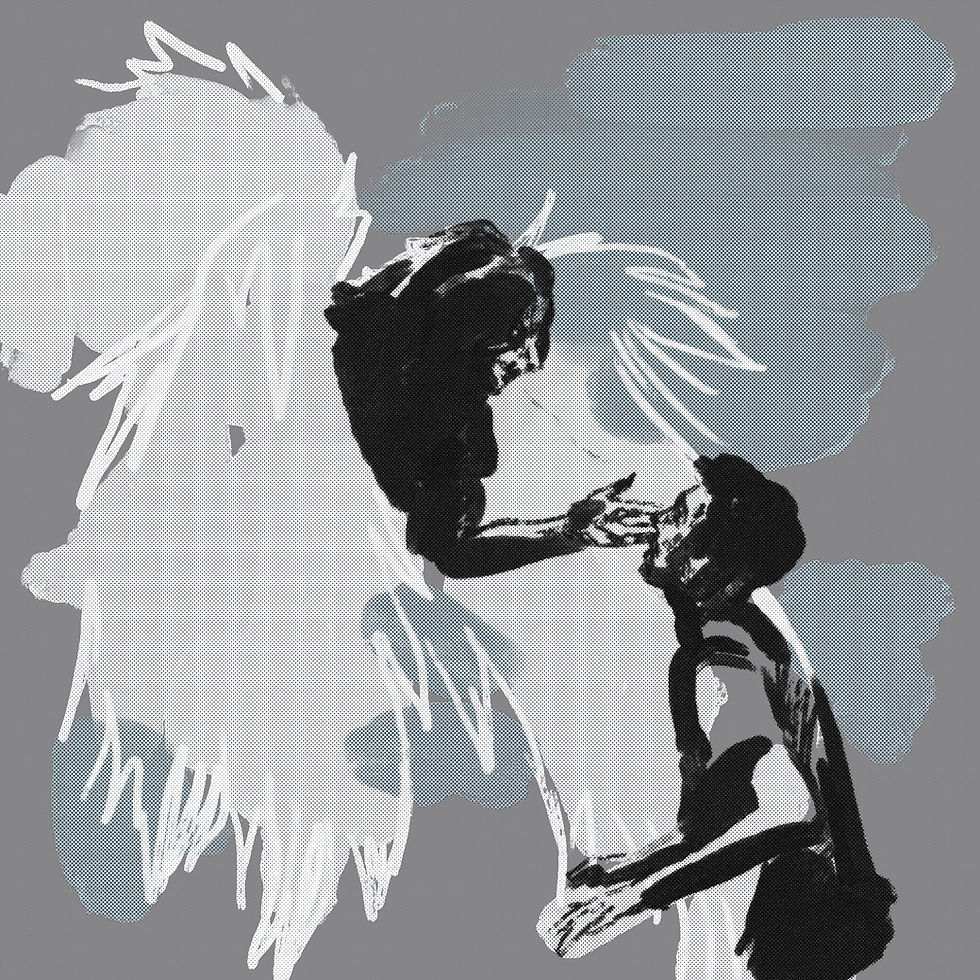"Evil Perfect" by Bramble Theatre Company
- Ella Boyd-Wong

- Nov 14, 2024
- 4 min read

I feel almost spoiled, having been to two plays in a row that I was moved enough by to want to write about. Usually there’ll be some floaters, but I do not deceive you – they do not always ignite. Just after having seen Bottle Fly, I was not sure I could love again, not so soon, not like this
– but this all turned as my expectations were dashed by the thrilling-political-unforgiving lore of Evil Perfect.
Sexy and sorrowful, revolutionary and remorseful, the tension between these characters, between the audience, is strong and devastating. In an incredibly short period of time, we get to know them unbelievably well, we see what they want, we understand their motivations, we can predict how they will react. We see ourselves in all the characters, in different spectrums of how we may appear in our lives. Jo, played by Ebby Offord, the closest in proximity to the dystopia of the world, hinting at our tendency to go with the “way the world works” and the fear that can couple with the concept of leaving it. Brian, played by Brandon Burns, playing as the vulnerability that can come from violence and wrongdoing, regret and remorse, and the possibility of change, growth, resetting boundaries for the good around us, which we may not feel within. Lily, played by Ashley Neal, stunned completely as a truth of the animalism and chaos that merges in us when we are at our lowest – delirium, grief, scapegoating and frustration of the status quo, she was… undeniably visceral, almost making the audience uncomfortable enough to shift in their seats. But not so much as to drive away Puck, played by Danny Breslin, who is the fuel for this broken machine. Our default option for a protagonist, a chosen one, we watch a babe in the woods affected by individuality and curiosity become a consequence to reckon with, how vengeance and revolution can sour when combined.
It’s hard to pinpoint wrong and right, as is a realistic depiction for such a mirror-grasping subject. A narrative warning the dangers of cancel culture, self-policing, and political correctness sounds like it would be another preach in a sea of them, but not so. A topic of a little wooden horse stood out to me as if highlighted. In our ideals, we want to be able to say everyone should be equal, but… we’re all fundamentally different. It’s more complicated than “equal”, playwright Spencer Huffman tries to tell us. Puck’s reactionary individualistic shift from toxic communal society is still toxic. As in Margaret Atwood’s A Handmaid’s Tale, the perversion that is Gilead is antagonistically worse, even though the United States is also broken. If the overarching all-seer is wrong to control everyone, so is one human individual.
My partner and I stepped into some fast food post-show, Bowie’s “Space Oddity” playing while we discussed. Brian’s physical likeness to J.B. Pritzker was mentioned. I offered my interpretation that Puck was an allegory for Christ, an important individual, powerful, the son of a mighty and all-loving master of society, but his interpretation had gone in different directions. Realistic, as the subject matter pulls the viewer to many places, so it is bound for us to see separate visions. We did agree, however, that this small four-person cast had no weakest link – they all performed exactly what their characters were meant to make us feel. For me, though, Brian and Jo were who really raised my attention. What can I say, I’m a romantic. I squeezed my partner’s hand in the moments when Brian described his feelings for Jo. My heart swelled and broke.

I encountered a Lily in the world recently. The rector had been asking us in sermon that in our confusion and distress following the first Tuesday of November, in her own words, to look towards the sick and the struggling, to give support and to support giving. The Lily didn’t interrupt mid-sentence, but she was unannounced, proclaiming as she walked between the pews the holes in the service she was witnessing, telling the congregation to “stop acting.” But her ferverous voice spoke out for her mother, who she assured us was collected and loved by the universe. She loved, and had been loved. She’d lost, and now was lost. I felt more than ever that Lily stoof for all victims of a system, victims looking for a source of catharsis or even a canvas for projection. She is perhaps the most important character of this narrative because her real presence in our real world is the most dire, the most in need of an outstretched hand and yet one of the least likely to accept it or even receive it. Lily deserved to feel safe, but in the end, she was failed by two systems, the one meant to be the solution showing the true danger. I’m glad of how stirring the fictional Lily was, and discouraged by the consistent presence of real Lilys damaged by our complicity, the effects of the political and social choices of generations gone and present alike.
I have had to remind myself several times how special the show was, that this is the world premiere of Evil Perfect. Its appropriately addressing worldbuilding combined with unapologetically emotional presentations like this cast has given us, I do not expect that the next iteration of this script is long into the future. I know I hope to be pulling this playscript down from a shelf for further analysis very soon.
Evil Perfect, script by Spencer Huffman, dir. Jonathan Shaboo, Bramble Theatre, Chicago, IL, 2024. The world premiere of Evil Perfect ran from October 17th to November 11th, 2024.



Comments